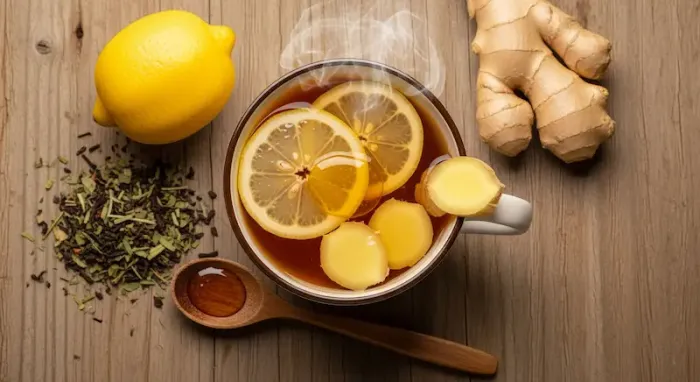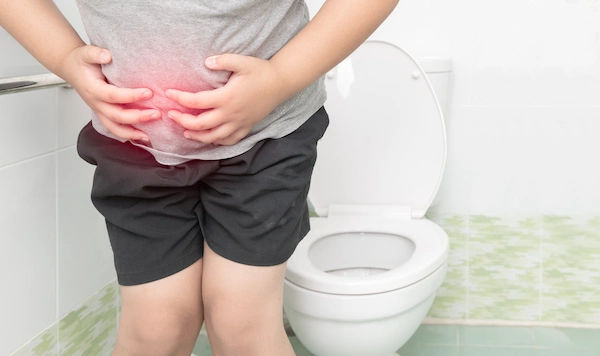Guide to Stop Loose Motions With These 3 Simple Homemade Remedies
Discover three effective and easy-to-make homemade remedies to quickly stop loose motions (diarrhea). Learn about the BRAT diet, hydration, and natural ingredients for fast relief.


Introduction
Loose motions can derail your day—draining energy, disrupting plans, and leaving you unsure what to eat or drink. The good news: most cases are short-lived and respond well to simple steps at home. In this guide, you’ll learn three doctor-approved, simple homemade remedies to stop loose motions faster: rehydrating correctly with oral rehydration solution (ORS), eating binding foods in the right mix (banana–rice–curd), and using probiotics with soluble fiber to restore stool form. You’ll also get a clear list of what to eat and avoid, warning signs that mean it’s time to see a doctor, and special advice for children, older adults, pregnancy, and travelers. Whether your loose motions came on after a dodgy meal, a stomach bug, or a course of antibiotics, these evidence-based tips can help you feel better—safely and quickly—at home. If symptoms persist or you spot red flags, we’ll show you exactly when and how to escalate care.
What are loose motions, and when is home care safe?
Loose motions—common shorthand for diarrhea—means more frequent, looser-than-normal stools, often with urgency. Most episodes are acute (lasting under 14 days) and are caused by viral gastroenteritis (“stomach flu”), foodborne infections, changes in diet, medication side effects (especially antibiotics), or travel-related microbes [1,5]. If you’re otherwise healthy and have mild to moderate symptoms without red flags (see below), home care is appropriate for the first 24–48 hours, focusing on fluids, ORS, and gentle foods [2,9].
Common triggers:
• Infections: viruses (e.g., norovirus, rotavirus), bacteria (e.g., E. coli), parasites (e.g., Giardia) [1].
• Food issues: lactose intolerance, high-sugar drinks causing osmotic diarrhea, spicy/fatty meals.
• Medications: antibiotics (disrupt gut bacteria), metformin, magnesium-containing antacids [5].
• Travel exposure: contaminated food/water (traveler’s diarrhea) [4].
Red flags—seek medical care:
• Signs of dehydration: very dry mouth, little/no urine, dizziness, lethargy [1,9].
• Blood or black tarry stools; high fever (≥38.5°C).
• Severe abdominal pain, persistent vomiting, or inability to keep fluids down.
• Diarrhea lasts more than 48 hours in adults or 24 hours in children; weight loss or worsening weakness.
• Recent hospitalization, chemotherapy, or fragile immune system.
• For children under 5, older adults (65+), pregnant people, or those with heart/kidney disease—have a lower threshold to seek care [1,9].
Unique insight: Many people over-restrict food for too long. Evidence supports continued, gentle feeding alongside ORS—this shortens illness and supports recovery [1,2]. If symptoms persist beyond two weeks, consult a doctor online with Apollo 24|7 for further evaluation, and consider stool tests if advised.Consult a Top General Physician
Remedy 1: Rehydrate right (Homemade ORS and rice-water variant)
Why ORS works
The fastest way to stabilize loose motions at home is proper rehydration. ORS (oral rehydration solution) exploits sodium-glucose co-transport in the small intestine: glucose helps sodium (and thus water) be absorbed efficiently, even when diarrhea is ongoing [1,2]. ORS is the global standard of care and has saved millions of lives [1].
Simple recipes
• Classic homemade ORS (WHO-style approximation): Mix 6 level teaspoons of sugar + 1/2 level teaspoon of table salt into 1 liter of clean drinking water. Stir until fully dissolved. Taste should be “not too salty” like tears—adjust if needed. Sip slowly and steadily [1,2,9].
• Rice-water variant (gentle on the gut): Boil 1/2 cup white rice in ~4 cups water for 30–40 minutes, strain and cool. To create a rice-based ORS, add a small pinch of salt (about 1/4 teaspoon per 1 liter of rice water) and 2–3 teaspoons of sugar per liter; taste to ensure it’s mildly salty, not sweet. Use in addition to, not necessarily instead of, standard ORS; rice starch can be soothing and may help stool consistency [1,2]. Avoid very sweet rice water—excess sugar can worsen loose stools.
How much to drink and how
• Adults: Aim for 2–3 liters/day total fluids, with at least 1–1.5 liters from ORS. Take small sips every 5–10 minutes—this is often better tolerated than large gulps [1,9]. Long-tail keyword: signs of dehydration in diarrhea.
• Children: Offer frequent small sips. After each loose stool, give 10–20 ml/kg of ORS over 1–2 hours. If vomiting, pause 10 minutes, then resume very small sips or spoon-feeds [1,2].
• Monitor: Urinating every 3–4 hours with pale-yellow urine is a good hydration sign.
Hydration schedule you can follow today
• Morning: 250–500 ml ORS over 60–90 minutes.
• Midday: 250 ml water/herbal tea; 250 ml ORS.
• Afternoon: 250–500 ml ORS + 250 ml diluted soup/broth.
• Evening: 250 ml water + 250 ml ORS.
• Overnight: Keep ORS at bedside for sips after trips to the bathroom.
Evidence & extra tips:
• WHO and NHS both prioritize ORS for acute diarrhea; coconut water or clear broths can supplement but don’t replace the electrolyte balance of ORS [1,9].
• Avoid pure fruit juice, cola, and energy drinks; their high sugar can worsen diarrhea [9].
• If you have heart/kidney disease, ask a clinician about fluid and electrolyte limits.
Remedy 2: The Banana–Rice–Curd plate (BRAT-plus, upgraded)
Why binding foods help
Binding foods rich in soluble fiber and pectin (like ripe bananas and rice) can absorb excess fluid in the bowel, improve stool form, and calm urgency. Curd/yogurt with live cultures helps restore a healthy gut microbiome—especially helpful after antibiotic-related loose motions [3,6]. While the old BRAT diet (bananas, rice, applesauce, toast) is no longer recommended as the sole diet due to limited nutrients, BRAT-style items in a balanced, gentle plan are effective during recovery [6].
The “3-bowl” plate: exact portions
• Bowl 1: Ripe banana (1 medium), mashed. Optionally add a pinch of salt and a sprinkle of roasted cumin to taste. Long-tail keyword: banana for loose motion.
• Bowl 2: Soft-cooked white rice or rice congee (1 cup cooked). You can add a little salt. If you tolerate it, a spoon of moong dal water can add gentle protein.
• Bowl 3: Plain curd/yogurt (1/2–3/4 cup) with live cultures. If lactose-sensitive, try lactose-free yogurt or small amounts of probiotic buttermilk. Long-tail keyword: curd for loose motion.
How to eat it
• Lunch and dinner: Create small, frequent meals using the 3 bowls. Start with a few spoonfuls of curd and rice, then banana. Eat slowly. Repeat every 3–4 hours based on appetite.
• Add-ons: Clear vegetable soup, soft idlis/khichdi, or boiled potatoes can rotate in to diversify nutrients. Avoid chilies, heavy oil, and high-fiber peels during the acute phase.
Sample day menu
• Breakfast: Rice congee + a few spoonfuls of curd.
• Mid-morning: Mashed banana; warm ginger-chamomile tea (unsweetened).
• Lunch: Rice + curd + banana (small portions of each).
• Evening: Clear soup or dal water + diluted buttermilk (a pinch of salt + roasted cumin).
• Dinner: Soft khichdi (more rice than dal) + curd.
Evidence & nuance:
Ongoing feeding with simple, familiar foods is recommended by WHO; it shortens illness vs. fasting [1].
Yogurt with live cultures supports the microbiome; some probiotic strains can shorten the duration of acute diarrhea by about 1 day on average [3].
If dairy worsens symptoms, skip curd temporarily and prioritize banana–rice; reintroduce yogurt later. Long-tail keyword: what to eat during diarrhea.
Remedy 3: Probiotics + soluble fiber (done right)
Probiotics: what the evidence says
• A large Cochrane review shows certain probiotics reduce the duration of acute infectious diarrhea (particularly in children), typically by about 24 hours, and can reduce stool frequency on day 2 of illness [3]. Strains with the most evidence include Lactobacillus rhamnosus GG and Saccharomyces boulardii. For adults, they’re generally safe and can be beneficial post-antibiotics and in traveler’s diarrhea self care [3,4]. Long-tail keyword: probiotics for diarrhea in adults.
How to use them safely
• Yogurt/curd or kefir with live cultures: 1/2–1 cup twice daily if tolerated.
• Probiotic capsules/sachets: Per label dosing (look for at least 10–20 billion CFU/day for Lactobacillus/Bifidobacterium blends, or the dose specified for S. boulardii). Start early in the course for maximum benefit.
• If severely immunocompromised or critically ill, avoid probiotics unless advised by your physician.
Soluble fiber for stool form
Psyllium husk (isabgol) is a soluble fiber that absorbs water and forms a gel—helpful for both constipation and mild diarrhea by improving stool consistency. In irritable bowel syndrome, psyllium improves global symptoms and stool form compared with insoluble fiber [10]. For loose motions:
• Start low: 1/2 teaspoon (about 2 grams) psyllium in a full glass of water once daily. If tolerated, increase to twice daily for 1–3 days.
• Timing: Take between meals and away from other medications (by at least 2 hours). Ensure adequate fluids to prevent blockage.
• Avoid psyllium if you’re severely dehydrated, have swallowing difficulties, or if diarrhea is profuse and watery with red flags.
Combining probiotics and fiber
Pairing yogurt/curd (probiotics) with soluble fiber across the day can support the gut barrier and stool form. If dairy is an issue, use a non-dairy probiotic supplement and pair with rice congee and bananas (rich in pectin).
What to eat and what to avoid during loose motions?
What to eat
• Fluids: ORS is first-line; supplement with water, weak tea, clear soups, and coconut water (not as a full ORS substitute) [1,9].
• Low-residue, binding foods: white rice, rice congee, ripe bananas, boiled potatoes, plain toast/crackers, plain idli, soft khichdi (more rice than dal), applesauce without added sugar [6].
• Gentle proteins: moong dal water, soft scrambled eggs (if tolerated), poached chicken.
• Fermented dairy (if tolerated): curd/yogurt with live cultures, diluted buttermilk with a pinch of salt and roasted cumin.
What to avoid (and why)
• High sugar drinks (juices, sodas, energy drinks): they pull water into the gut and worsen diarrhea [9].
• Caffeine, alcohol: can irritate the gut and dehydrate [6].
• Very spicy, greasy, or fried foods: delay gastric emptying and irritate the gut.
• Raw roughage: large salads, raw crucifers (gas-producing), and fruit with peels during the acute phase.
Sample 24-hour meal plan
• Morning: 250 ml ORS on waking; plain toast with a little banana; warm water or weak tea.
• Mid-morning: Curd/yogurt 1/2 cup + a few spoonfuls of rice congee.
• Lunch: Soft rice + moong dal water + mashed banana.
• Afternoon: ORS 250 ml; diluted buttermilk with a pinch of salt + cumin.
• Dinner: Soft khichdi (2 parts rice:1 part moong dal) + plain curd if tolerated.
• Before bed: A few sips of ORS; avoid heavy meals late at night.
Unique tip: Many people add too much sugar to “rehydration” drinks. Keep sweetness low; if it tastes like juice, it’s too sweet and can prolong loose motions.
Special situations: kids, older adults, pregnancy, and travelers
Children
• Use ORS promptly; offer small, frequent sips from a spoon or syringe. Continue feeding with familiar foods; breastfed infants should continue breastfeeding [1,2].
• Zinc supplementation reduces duration and severity in children: 10 mg/day (under 6 months) or 20 mg/day (6 months to 5 years) for 10–14 days, per WHO/UNICEF guidance [1,2]. Ask your pediatrician before starting.
• Seek care urgently if: dry mouth, no tears, fewer than 3 wet diapers in 24 hours, sunken eyes/fontanelle, persistent vomiting, blood in stool, or high fever [1,9].
• If your child’s loose motions don’t improve in 24 hours or you see red flags, consult a pediatrician with Apollo 24|7.
Older adults and pregnancy
• Dehydration risk is higher; start ORS early, sip regularly, and monitor urine color/volume [1,9].
• Review medications (e.g., diuretics, metformin, magnesium antacids). Ask your doctor before using OTC anti-diarrheals in pregnancy.
• If symptoms persist beyond 24–48 hours or worsen, book a physical visit to a doctor with Apollo 24|7.
Traveler’s diarrhea
• Most cases are mild and respond to ORS, probiotics, and careful food choices [4].
• Bismuth subsalicylate can help reduce stool frequency; loperamide can reduce urgency for short periods when there’s no fever or blood in stools [4].
• Red flags abroad are the same; seek medical help promptly if severe [4]. Long-tail keyword: traveler’s diarrhea self care.
Medications, monitoring, and when to see a doctor
OTC medicines
• Loperamide: Can reduce stool frequency/urgency in non-bloody diarrhea, especially for travel or important activities. Avoid if you have fever or blood/mucus in stools, or suspected bacterial dysentery [4,5].
• Bismuth subsalicylate: May reduce frequency and help with nausea; avoid in aspirin allergy, anticoagulant use, pregnancy (consult clinician), or in children due to Reye’s risk [4].
• Antibiotics: Not routinely needed; reserved for certain bacterial causes or traveler’s diarrhea with severe symptoms—use only if prescribed [4,7].
Monitoring recovery
• Keep a simple symptom diary: number of stools, presence of blood/mucus, fever, abdominal pain, fluids taken, and urine frequency.
• Targets: Reduced frequency, thicker stool consistency, stable energy, urinating every 3–4 hours.
When to see a doctor
• Red flags listed earlier, or no improvement after 48 hours (adults) or 24 hours (children), or persistent diarrhea >14 days [1,9].
• If needed, a clinician may order stool tests (e.g., culture, ova/parasites), or blood tests (electrolytes). Apollo 24|7 offers a convenient home collection for tests like stool culture and basic blood electrolytes when your doctor recommends them.
• If your condition does not improve after trying these methods, book a physical visit to a doctor with Apollo 24|7.
Unique insight: Many people overuse loperamide early. Start with ORS and diet first; reserve loperamide for short-term control without fever/bloody stools, and stop once frequency improves.
Prevent future episodes (hygiene, food safety, gut resilience)
• Hand hygiene: Wash hands with soap and running water for at least 20 seconds after using the bathroom and before eating/prep; alcohol rubs help but don’t replace handwashing after bathroom use [1].
• Food safety: Eat hot, well-cooked foods; peel fruits yourself; avoid raw sprouts and undercooked meats. Keep cold foods cold (<5°C) and hot foods hot (>60°C).
• Water safety: Use filtered/boiled water; be cautious with ice when traveling [4].
• Gut resilience: Maintain a fiber-rich, balanced diet when well; include fermented foods you tolerate (curd/yogurt, kefir), and prioritize regular sleep and stress control.
Conclusion
Loose motions are unpleasant, but with the right plan most cases settle quickly. Begin with proven hydration using ORS, then build simple meals around binding, gut-friendly foods—ripe bananas, soft rice, and curd/yogurt. If you tolerate dairy, probiotics from curd or a supplement, paired with gentle soluble fiber, can help restore balance and improve stool form. Keep meals simple, avoid high-sugar and spicy foods during the acute phase, and track your progress. If symptoms persist beyond 48 hours, or if you notice blood in stool, high fever, severe pain, or signs of dehydration, don’t wait—consult a clinician. If symptoms persist beyond two weeks, consult a doctor online with Apollo 24|7 for further evaluation; if tests are advised, Apollo 24|7 offers a convenient home collection for lab work like stool culture or electrolytes. With these three simple homemade remedies—and smart escalation when needed—you can stop loose motions safely and get back to feeling like yourself.Consult a Top General Physician
Consult a Top General Physician

Dr. Chethan T L
General Physician/ Internal Medicine Specialist
5 Years • MBBS, MD, DNB (General Medicine)
Bengaluru
Apollo Medical Center, Marathahalli, Bengaluru

Dr. Rajib Ghose
General Physician/ Internal Medicine Specialist
25 Years • MBBS
East Midnapore
VIVEKANANDA SEBA SADAN, East Midnapore

Dr. Khuda Baksh Nagur
General Physician/ Internal Medicine Specialist
11 Years • MBBS, MD (GENERAL MEDICINE), Certificate Programme clinicians in Diabetes Management
Bengaluru
Medwin multispeciality clinic, Bengaluru
(25+ Patients)

Dr. Tanzeem Shajahan
General Physician/ Internal Medicine Specialist
7 Years • MBBS, MD (General Medicine)
Bengaluru
Medwin multispeciality clinic, Bengaluru

Dr. Rohit Basu
General Practitioner
8 Years • MBBS, DNB (General surgery)
East Midnapore
VIVEKANANDA SEBA SADAN, East Midnapore
Consult a Top General Physician

Dr. Chethan T L
General Physician/ Internal Medicine Specialist
5 Years • MBBS, MD, DNB (General Medicine)
Bengaluru
Apollo Medical Center, Marathahalli, Bengaluru

Dr. Rajib Ghose
General Physician/ Internal Medicine Specialist
25 Years • MBBS
East Midnapore
VIVEKANANDA SEBA SADAN, East Midnapore

Dr. Khuda Baksh Nagur
General Physician/ Internal Medicine Specialist
11 Years • MBBS, MD (GENERAL MEDICINE), Certificate Programme clinicians in Diabetes Management
Bengaluru
Medwin multispeciality clinic, Bengaluru
(25+ Patients)

Dr. Tanzeem Shajahan
General Physician/ Internal Medicine Specialist
7 Years • MBBS, MD (General Medicine)
Bengaluru
Medwin multispeciality clinic, Bengaluru

Dr. Rohit Basu
General Practitioner
8 Years • MBBS, DNB (General surgery)
East Midnapore
VIVEKANANDA SEBA SADAN, East Midnapore
More articles from Loose Motion
Frequently Asked Questions
Q1: What is the best home remedy for loose motions at night?
Use ORS in small, frequent sips and keep a bottle bedside. A small serving of rice congee or banana–curd before bed may settle the gut. Avoid caffeine, heavy meals, and sugary drinks.
Q2: Is curd good for loose motion?
Yes, many people benefit from curd/yogurt with live cultures during mild diarrhea. It provides probiotics that can shorten duration and improve stool form. If lactose-intolerant, choose lactose-free yogurt or use a probiotic supplement. Long-tail keyword: is yogurt good for loose stools.
Q3: Can psyllium husk stop loose stools fast?
Psyllium can help thicken stool in mild diarrhea by absorbing water. Start with 1/2 teaspoon in a glass of water once daily and increase cautiously. It’s not a substitute for ORS and should be avoided if dehydration or severe symptoms are present. Long-tail keyword: psyllium husk for loose stools.
Q4: What should I eat during diarrhea?
Focus on binding, low-residue foods like bananas, soft rice, boiled potatoes, plain toast, and curd/yogurt if tolerated. Sip ORS regularly, and avoid very sugary, spicy, greasy, or high-fiber raw foods. Long-tail keyword: what to eat during diarrhea.
Q5: When should I see a doctor for loose motions?
Seek care urgently if you have blood in stool, high fever, severe pain, signs of dehydration, persistent vomiting, or no improvement after 48 hours (adults) or 24 hours (children). If needed, consult a doctor online with Apollo 24|7.
.webp)

